A congressional panel has held a hearing on the threat to the U.S. homeland from the militant Islamist sect Boko Haram, based in northern Nigeria. Boko Haram has attracted more scrutiny after bombing the United Nations headquarters in the Nigerina capital Abuja, killing more than 20 people on August 26, 2011.
One of the Africa experts that testified at the House Homeland Security subcommittee hearing on the threat from the radical Islamist group to the United States is Peter Pham of the Atlantic Council of the United States. He told the panel that the name "Boko Haram" is made up of Hausa and Arabic words and translates roughly as "Western eductation is a sin."
"Thus Boko Haram is not only a name, but a slogan, to the effect that Western education and such products that arise from it are sacrilege," said Pham.
The Boko Haram militants say they are fighting for the creation of a Sharia-led nation in the north of Nigeria, and they do not recognize the authority of Nigeria's constitution or President Goodluck Jonathan.
Ricardo Laremont is a Professor of Political Science at Binghamton University in the state of New York. He explained the group's traditional operating methods.
"And since 2009, Boko Haram has attacked police officers and army officers and politicians and clerics, but primarily in northeastern Nigeria," said Laremont. "And they have been doing so by using assailants who used mopeds in drive-by attacks and they have used hand-guns, rifles and small explosives."
The House Homeland Security subcommittee's chairman, Republican Representative Patrick Meehan called the hearing to ask several Africa experts if they believed that Boko Haram may have widened its goals to include western targets, and possibly even the United States.
Peter Pham of the Atlantic Council said two suicide bombings this year have taken the threat posed by the group to a new level.
"Certainly the suicide bombings targeting symbols of Nigerian state authority and the international community represent a major advance in Boko Haram's capabilities and a significant shift in its messaging," he said.
But the experts seemd to agree that for now, the group as a whole does not pose a plausible threat to the United States. Lauren Ploch of the Congressional Research Service said some individual members of Boko Haram may have made statements against the United States, but added:
"I don't see currently from reporting that the larger Boko Haram following intends to target the United States or U.S. interests," said Ploch.
The experts at the hearing called on the United States to work with the Nigerian government on efforts to fight poverty and increase literacy in northern Nigeria, saying that Boko Harma is expoliting the misery and lack of opportunities for many in Nigeria's poorer North.
The United States currently provides $600 million a year in foreign aid to Nigeria.
US Congress Panel Probes Threat from Nigerian Islamist Sect Boko Haram
- By Cindy Saine








